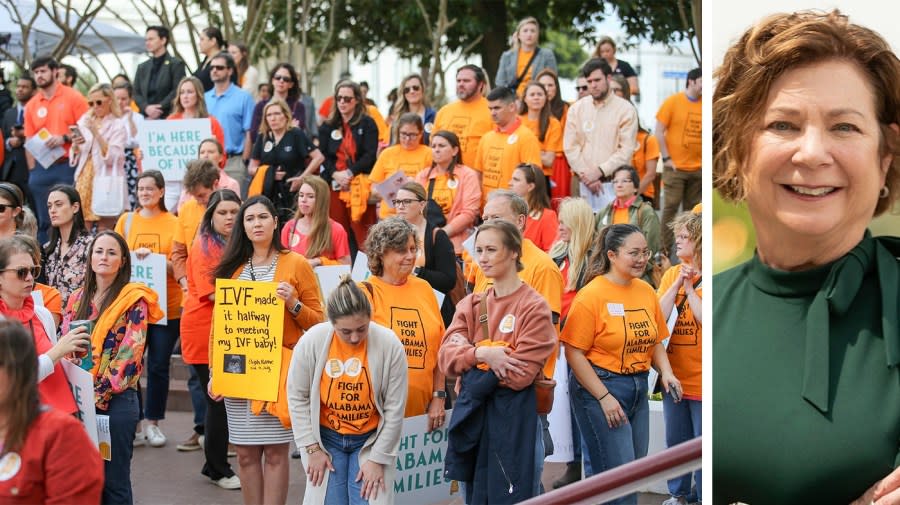Democrats’ Alabama win underscores political staying power of abortion, IVF

A special election in Alabama is the latest sign for Democrats that reproductive rights are a major motivating force for voters ahead of this fall’s elections.
Democrat Marilyn Lands beat Republican Teddy Powell in a special election for a state House seat in the Yellowhammer State on Tuesday, after she leaned into the issues of abortion and in vitro fertilization (IVF).
Lands’s landslide win in the purple district underscores the political staying power of reproductive rights as an election issue, one that could make the difference as Democratic control of Congress and the White House falls to a handful of states.
“I feel like [reproductive health care] was a very powerful motivator to get people out to vote in this election,” Lands told The Hill.
Lands, a licensed professional counselor who has also worked in Republican politics, defeated Powell, a Madison City Council member, for the special election in state House District 10, in the Huntsville area.
Lands spotlighted IVF and abortion in her ads, including recounting her own personal experience with abortion. Meanwhile, Powell leaned into issues like the economy and infrastructure.

Marilyn Lands, a Democrat who ran a campaign for an Alabama state house seat centered on reproductive rights, on is photographed March 26, 2024. Lands defeated Republican Teddy Powell to win the open legislative seat, according to unofficial returns March 26. Powell, a member of the Madison City Council, issued a statement conceding the race and congratulating Lands on her victory. ( Marilyn Lands via AP)
Reproductive issues became particularly relevant as the race came against the backdrop of an Alabama court ruling last month that prompted IVF services to be temporarily paused.
The Alabama Supreme Court’s ruling in February, which found frozen embryos could be considered children under state law, set off a national furor around IVF access as providers across the state halted fertility services because of concerns about litigation.
Amid a chorus of criticism, including from many Republican leaders, the state’s GOP-controlled Legislature hastily drew up and passed legislation protecting IVF providers from prosecution and legal action. But fertility groups argued the bill didn’t go far enough, as it did nothing to temper the high court’s ruling.
Ahead of the election, some Republican strategists argued abortion and IVF were separate issues.
Nonetheless, Lands beat Powell by a whopping 25 points in a district that just barely went for former President Trump in 2020.
Krishana Davis, a senior vice president at the Democratic consulting firm Precision Strategies, said one thing Lands did right in her campaign was be unapologetic about her stance on reproductive rights.
“So many times we see candidates who will give very top-level language, they kind of skirt the issue, they give a lot of innuendos about what they mean,” said Davis, who noted Lands instead was “very vocal” about her position.
Davis argued other Democratic candidates could take Lands’s win as a sign they too can be forthright in their stance on reproductive rights.
Top Stories from The Hill
The Alabama special election is also not the first to underscore the salience of reproductive rights. During last November’s Virginia state legislative races, Democrats leaned into the issue of abortion, which allowed them to keep their edge in the state Senate and flip the state House.
In “special elections like this, in which there’s nothing else to turn out your vote, it’s much more about identifying your voters and then inspiring them to turn out,” Republican strategist Angi Horn said. “And I mean, nobody can question the results that her campaign absolutely identified their voters and then inspired them to turn out.”
“If I was a Democrat in Alabama, and I saw this happen, sure … I would try to copy it, do the same thing … I think it would be ridiculous not to,” Horn added.
But the GOP strategist also cautioned about extrapolating too much from the special election in terms of what it means for the state’s politics.
“I think it’s important to not try to paint this as what Alabama is or the state of Alabama for two reasons: One, it’s a special election, and two, it is a very — going into a very purple district,” she said, noting that Lands’s strategy likely would not have worked in southeast Alabama, for example.
Though Alabama is extremely unlikely to turn blue in a presidential election anytime soon, Lands’s victory suggests reproductive issues can still make the difference in critical swing seats.
The salience of reproductive rights is particularly important given that a handful of swing states will determine who wins the White House and control of Congress in November.
According to KFF pollster Ashley Kirzinger, 12 percent of voters nationally have said abortion is an important issue for them — lower than during the midterms, when about a quarter said it was the most important issue to them. When it comes to motivating issues, voters generally don’t pay close attention to court battles, according to Kirzinger, but the aftereffects do catch the public’s attention.
“I think when it starts to motivate voters and they’re starting to pay more attention is when some sort of right or access is taken away,” Kirzinger said. “We didn’t specifically ask about IVF, but I think what we saw was the attention around that Alabama Supreme Court decision.”
Kirzinger added the view that voters are only staunchly for or against abortion is misleading. She noted there is a segment of Republicans who supported overturning Roe but don’t believe in banning all abortions, with about 8 in 10 saying they want abortion protected for patients experiencing pregnancy-related emergencies.
“There is nuance within the Republican attitude on abortion. And I think that’s always important to point out,” she said.
Reproductive-rights advocates have previously scored wins in purple and red states. Months after the Supreme Court overturned Roe v. Wade, Kansans rejected a ballot measure that would have given the state Legislature the authority to restrict abortion.
Voters in Michigan and Ohio passed ballot measures to enshrine abortion protections within their state constitutions. Voters had also earlier handily defeated a separate ballot measure in Ohio that would have sought to raise the threshold to amend the state constitution, a move largely seen as a way to thwart reproductive-right advocates from passing the abortion ballot measure that fall.
Abhi Rahman, communications director for the Democratic Legislative Campaign Committee, noted Michigan will be holding several special elections next month in the suburbs of Detroit, which will determine control of the state House. He noted the Democrats running in those races are also spotlighting reproductive rights.
During a press briefing with the reproductive rights PAC EMILY’s List in January, Biden-Harris 2024 campaign manager Julie Chávez Rodríguez said their reelection bid’s strategy on reproductive rights would highlight Trump’s anti-abortion stance.
The campaign did just that following Lands’s win on Tuesday, with Chávez Rodríguez saying in a statement, “Trump overturned Roe v. Wade, paving the way for attacks on women’s freedoms like we saw in Alabama — now he’s running to ban abortion and gut access to IVF nationwide. Tonight’s results should serve as a major warning sign for Trump.”
Davis, from Precision Strategies, said that while highlighting potential Republican action on abortion in the future is “fair,” Democratic candidates should focus on their own personal position instead of what their opponent is running on.
“Candidates need to define themselves very clearly about who they are. Because, also, we’ve all been very clear who Trump is,” Davis said. “That has been overly saturated in media across social media online.”
For the latest news, weather, sports, and streaming video, head to The Hill.

